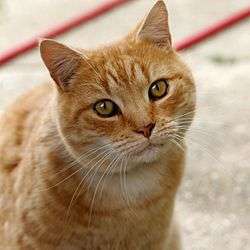猫
See also: 貓
| ||||||||
Translingual
| Stroke order | |||
|---|---|---|---|
 | |||
| Japanese | 猫 |
|---|---|
| Simplified | 猫 |
| Traditional | 貓 |
Han character
猫 (radical 94, 犬+8, 11 strokes, cangjie input 大竹廿田 (KHTW), four-corner 44260, composition ⿰犭苗)
Derived characters
- 𢵝, 𫫯
References
- KangXi: page 714, character 27
- Dai Kanwa Jiten: character 20535
- Dae Jaweon: page 1127, character 1
- Hanyu Da Zidian: volume 2, page 1352, character 1
- Unihan data for U+732B
Chinese
Glyph origin
| Characters in the same phonetic series (苗) (Zhengzhang, 2003) | |
|---|---|
| Old Chinese | |
| 貓 | *mreːw, *mrew |
| 描 | *mreːw, *mrew |
| 媌 | *mreːw, *mreːwʔ |
| 緢 | *mreːwʔ, *mreːws, *mrew |
| 苗 | *mrew |
| 猫 | *mrew |
| 庿 | *mrews |
Phono-semantic compound (形聲, OC *mrew) : semantic 犬 + phonetic 苗 (OC *mrew).
Definitions
| For pronunciation and definitions of 猫 – see 貓 (“cat; to hide oneself; etc.”). (This character, 猫, is the simplified and variant form of 貓.) |
Notes:
|
Japanese
Readings
- Go-on: みょう (myō)←めう (meu, historical)
- Kan-on: びょう (byō, Jōyō)←べう (beu, historical); ぼう (bō)←ばう (bau, historical)
- Kun: ねこ (neko, 猫, Jōyō)
Compounds
Etymology 1
| Kanji in this term |
|---|
| 猫 |
| ねこ Grade: S |
| kun’yomi |
*⟨ni1a-ko1ma⟩ → ⟨ne1ko1ma⟩ → /nekoma/ → /neko/
From Old Japanese. Shortened from earlier nekoma (see below).
Noun
猫 (counter 匹, hiragana ねこ, katakana ネコ, rōmaji neko)
- a cat
- 猫が二匹居る。
- Neko ga nihiki iru.
- There are two cats.
- 家には猫が三匹います。
- Ie ni wa neko ga sanbiki imasu.
- There are three cats in the house.
- 931–938, Wamyō Ruijushō, book 7, page 56:
- 猫: 野王案、猫、音苗、禰古麻、下總本有和名二字興河海抄引此合、本草和名同訓、或省云禰古、新撰字鏡、狸、禰古、按狸一名猫、見本草和名、似虎而小、熊捕鼠為糧
- 猫が二匹居る。
Derived terms
Derived terms
- 子猫 (koneko), 仔猫 (koneko): a kitten
- 黒猫 (kuroneko): a black cat
- 麝香猫 (jakō neko): civet
- シュレーディンガーの猫 (Shurēdingā no neko): Schrödinger's cat
- 猫手 (nekote)
- 猫間 (nekoma)
- 猫又 (nekomata)
- 猫耳 (nekomimi): nekomimi
- 唐猫 (karaneko)
- 化け猫 (bakeneko): a monster cat
- 招き猫 (manekineko)
- 虎猫 (toraneko)
- どら猫 (doraneko)
- 山猫 (yamaneko)
- 猫可愛がり (nekokawaigari)
- 三毛猫 (mikeneko): a calico cat
Idioms
Idioms
- 猫も杓子も (neko mo shakushi mo)
- 猫の手も借りたい (neko no te mo karitai)
- 猫舌 (nekojita): "cat tongue", someone who is incapable of drinking or eating anything hot due to having an overly sensitive tongue
- 猫に鰹節 (neko ni katsuobushi)
- 猫に小判 (neko ni kohan): pearls before swine
- 猫の額 (neko no hitai)
- 借りてきた猫 (karite kita neko)
- 猫を被る (neko o kaburu): feign innocence
Etymology 2
| Kanji in this term |
|---|
| 猫 |
| ねこま Grade: S |
| kun’yomi |
*⟨ni1a-ko1ma⟩ → ⟨ne1ko1ma⟩ → /nekoma/
From Old Japanese. Originally a compound of にゃ (nya, “onomatopoeia for the sound a cat makes (compare English mew, meow)”) + こま (koma, “four-legged animal”).
Obsolete; replaced by shorter form neko in modern Japanese.
Noun
猫 (hiragana ねこま, rōmaji nekoma)
- (obsolete) a cat
- 931–938, Wamyō Ruijushō, book 7, page 56:
- 猫: 野王案、猫、音苗、禰古麻、下總本有和名二字興河海抄引此合、本草和名同訓、或省云禰古、新撰字鏡、狸、禰古、按狸一名猫、見本草和名、似虎而小、熊捕鼠為糧
- 931–938, Wamyō Ruijushō, book 7, page 56:
References
- Minamoto, Shitagō; Kyōto Daigaku Bungakubu Kokugogaku Kokubungaku Kenkyūshitu (931–938) Shohon Shūsei Wamyō Ruijushō: Honbunhen (in Japanese), Kyōto: Rinsen, published 1968, →ISBN.
Okinawan
Compounds
This article is issued from
Wiktionary.
The text is licensed under Creative
Commons - Attribution - Sharealike.
Additional terms may apply for the media files.
